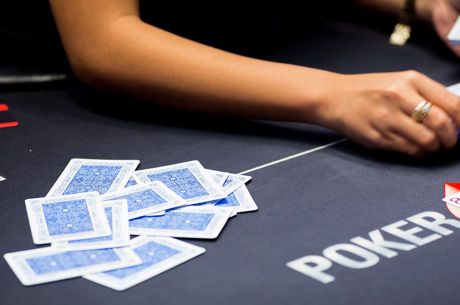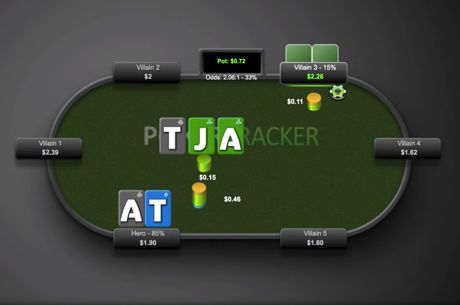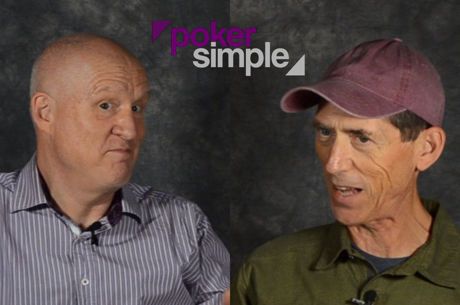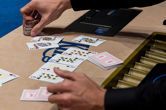What If You Could Fast-Forward Through the Folding?
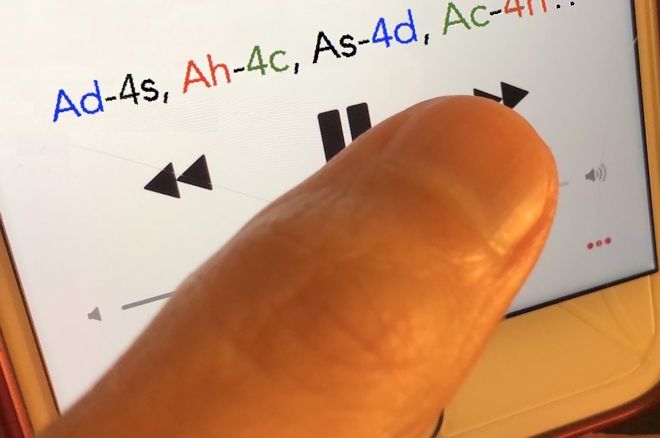
What if you could think of a range of hands, and then fast-forward to your next naturally occurring hand in that range?
Take me to my next pocket pair or ace-king or suited connector.
And ZOOP! You��re there. The hands you folded while waiting for your chosen hands would take up zero time because you have a superpower that allows you to skip them.
Playing Omaha hi-lo, you could set your range to: hands with ace-deuce. And now every time you peek at the corners of a new hand, two of your four cards are an ace and a deuce.
Playing pot-limit Omaha, do you like J-10-9-8? How about ace-ace double-suited? That��s what your life would be like. In every game you play. A steady stream of premium starters. The pain of boredom, gone. The fear and loathing of preflop leaking, gone.
Playing no-limit hold��em, you have A-4-offsuit. One player opens and two players call. The stacks are deep and the players are festive. It��s an automatic call for you, but it doesn��t spark joy. You��d like it a lot more if you had something like 9-8-suited. No problem. Just fast-forward, and you can have suited connectors on the button every hand if you like. You never have to settle for A-4-offsuit.
With the ability to fast-forward, how often would you call a raise from the blinds with 10-7-suited? For me the answer is never, and it��s not close. Why would I want to pay money for the worst situation �� middling starters out of position �� when I could have J-10-suited on the button and play that instead?
You��re in a game with four pros and a fish. The fish is seeing lots of flops. He��s easy to read. He��s why the game is still going. He��s on your right, and he just opened to 4x. It��s your turn. You have K-8-suited��
And you are torn between two instincts. You want to three-bet, to isolate the targeted player. But if you three-bet and one of the tough players behind you calls or raises, that��s a losing situation. So your other impulse is to fold.
One voice says to engage. The other voice says to wait for a better spot. You trust them both: the strike-now voice, and the not-yet voice. But they are so often in conflict. What to do?
Ask yourself two questions��
At the table, at the moment of truth, when the action is on you before the flop, and you have a hand that��s somewhere between auto-play and auto-fold, pretend you have a fast-forward button, and ask yourself:
If I had the ability to instantly fast-forward to my next pocket pair or ace-king, would I play this marginal hand in this marginal situation?
The second question is why I brought you here today. And you don��t have to wait. You can ask it right now:
If I would play differently in the fast-forward universe, then doesn��t that mean I should play differently in this one?
When I play poker, I pretend I have inexhaustible patience and infinite time to play, and then I play as if those things were true. Sometimes I can sail across an ocean of card dead without a frown.
This one time, I was playing $5/$10 no-limit hold��em at the Bellagio for a week. On Wednesday I sat down at 11 a.m. to a new session and my first 45 hands happened to be auto-fold situations before the flop. When I took my first break, I had played for 1.5 hours, I was stuck half a stack, and my patience was undiminished. It was like it never happened.
Use painless fast-forwarding, in real time, to prevent leaking while card dead.

World-class coach and author Tommy Angelo is now offering poker pain relief to everyone. You can schedule a call to talk to Tommy about bad betting, bad quitting, bad tempers, or whatever else is hurting your game. Just go to tommyangelo.com. Angelo's first book, Elements of Poker, was called "the seminal poker text of the 21st century" by The London Times, and it has revolutionized the way serious players approach the game.

